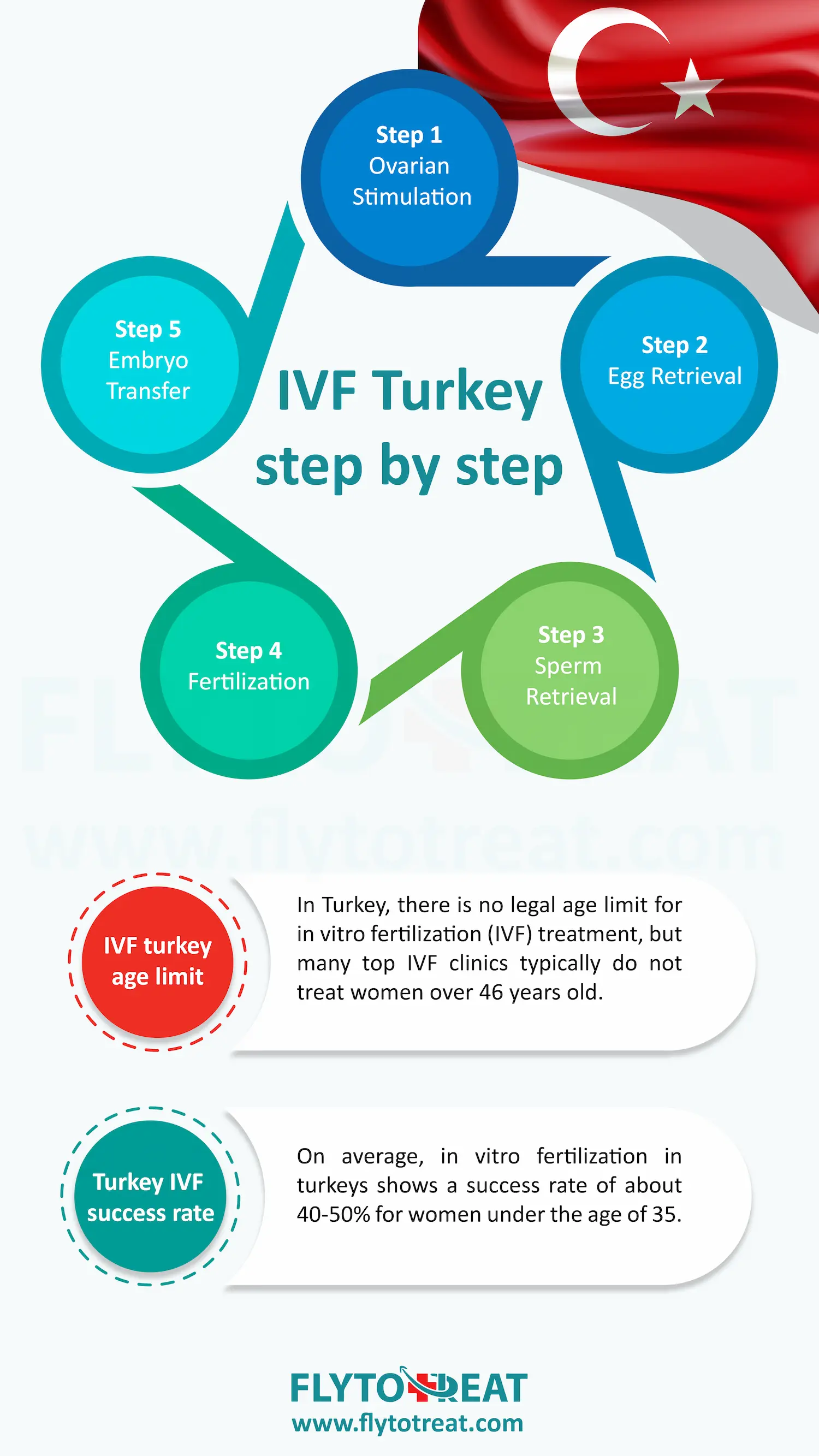
Is Turkey Good for IVF Treatment?
When considering IVF treatment in Istanbul, Turkey emerges as a leading destination due to its combination of affordability, high-quality care, and the presence of some of the best IVF doctors in Turkey. This article will provide insight into various aspects of IVF treatment in Turkey, including legal regulations, success rates, and the options available for patients. It aims to address critical questions such as "Is Turkey good for IVF treatment?" and "What is the age limit for IVF in Turkey?" If you are wondering whether Turkey is the right choice for your fertility journey, this guide will provide valuable answers.
IVF Turkey step by step
Artificial insemination has some steps that you should be informed about before deciding to undergo this process. Here the major steps of this treatment are explained.
Step 1: Ovarian Stimulation
In the first step, the fertility doctor prescribes some hormonal medications that are generally in the form of ampules. In every menstrual cycle, ovaries produce one mature egg to be used for fertilization. Nevertheless, in an IVF cycle, more eggs are needed to produce multiple embryos. Therefore, these hormonal medications are used to stimulate the ovaries for producing more mature eggs.
While you are using medications, the follicles’ status and hormonal level will be evaluated via ultrasounds and blood tests. Once the eggs are mature enough and ready for fertilization, your doctor removes the eggs through the egg retrieval procedure. It is possible that ovarian stimulation gets canceled before the egg retrieval due to reasons like the inadequate number of developing follicles, premature ovulation, the risk of ovarian hyperstimulation syndrome, or other medical issues.
Step 2: Egg Retrieval
When the egg follicles seem ready, the last trigger shot is injected 34 to 36 hours before the egg retrieval (puncture). Egg retrieval is a minor surgical procedure that is often carried out under anesthesia at a fertility clinic or your doctor’s office. Under the guidance of ultrasound, a doctor puts a thin hollow tube through the vagina and into the ovary and follicles that hold your eggs. The needle is connected to a suction device that pulls the eggs out of their follicles gently. After the egg retrieval process, you should stay at the hospital until you are fully awakened from the anesthesia. You may feel a little cramping or pressure, but it will go away quickly.
Step 3: Sperm Retrieval
The male partner should provide the semen sample on the same day of egg retrieval. This process is often done through masturbation; however, other methods of sperm retrieval like testicular aspiration are used in case there is a requirement. After collecting the sperm sample, it will be washed in order to enhance its quality and increase its chance of fertilizing the eggs. Donor sperm can also be used in some countries, but it is not allowed in Turkey.
Step 4: Fertilization
The process of fertilization can happen in different ways of Conventional insemination, Intracytoplasmic sperm injection (ICSI), Assisted hatching, and In Vitro Maturation (IVM).
• Conventional insemination: In a laboratory environment, the eggs are simply combined with sperm cells in a special container, and insemination occurs.
• Intracytoplasmic Sperm Injection (ICSI): In case the sperm has low motility and cannot swim well, the sperm may be directly injected into the eggs by a method named Intracytoplasmic sperm injection or ICSI for short. As the cells divide and become embryos, an embryologist monitors their progress.
• Assisted hatching: in this technique, in order to make the embryo implantation easier, the embryo is hatched from its surrounding membrane (zona pellucida). In this procedure, a hole is made in the outer surface before the transfer to help the embryo hatch and implant in the uterus lining. If you are of older ages, using frozen eggs or embryos (zona pellucida can get hard by freezing), or you have experienced multiple failed IVF cycles, then you may consider assisted hatching.
• In Vitro Maturation (IVM): this technique is one of the assisted reproductive technologies that are a part of the IVF procedure. In this method, the eggs are collected from the ovaries before they are matured and ready for fertilization. In this method, there is no need for multiple hormonal shots to stimulate egg maturation inside the ovaries. Rather than that, the eggs will be matured in a laboratory. By doing the IVM method, there is less need for injections, exams, and spending time for the eggs to be matured inside the ovaries before the follicles puncturing step.
Step 5: Embryo Transfer
After 3-5 days have passed from the fertilization, the embryos are ready to be transferred into the uterus. Depending on the medical condition of the recipient, one or more embryos are transferred into her uterus. Embryo transfer is a simple procedure that is done in about 10 minutes without the need to use anesthesia. In this procedure, the doctor inserts a thin tube into your uterus through your cervix. Then the embryos that are floating in a special fluid are injected into the uterus through the catheter.
If the embryo attaches to the uterus lining, pregnancy will happen. After the embryo transfer, it is better to rest and go back to your normal activities the next day. For the first 8 to 10 weeks, you may also get progesterone in the form of pills or shots. The hormones make the embryos survive easier in your uterus. After 10-14 days, you can take a pregnancy blood test. If the result is positive, you are officially pregnant.

IVF turkey age limit
In Turkey, there is no legal age limit for in vitro fertilization (IVF) treatment, but many top IVF clinics typically do not treat women over 46 years old.This limitation arises because Turkey prohibits egg donor treatments, requiring women to use their eggs.The best IVF doctors in Turkey conduct a thorough screening process to assess the viability of a woman's eggs.The success rate for IVF treatment in Istanbul decreases significantly after age 40 due to reduced egg quality and quantity.
Turkey IVF success rate
The IVF success rate in Turkey varies depending on several factors, including the age of the patient and the fertility clinic chosen. On average, in vitro fertilization in turkeys shows a success rate of about 40-50% for women under the age of 35. However, this rate decreases as women age, with lower chances of success for those over 40. The best IVF doctors in Turkey focus on individual treatment plans, which can improve the chances of pregnancy, especially for younger patients. Additionally, the IVF treatment in Istanbul is known for its modern techniques and high-quality care, which help to enhance success rates. The availability of experienced specialists at top IVF clinics in Turkey also plays a crucial role in achieving better outcomes. While age and medical history influence success, Turkey remains a popular destination for IVF treatment, offering patients an affordable and effective option for starting a family.
Is Turkey good for IVF treatment?
Turkey has become a leading landing place for in vitro fertilization (IVF) due to various advantages. For couples looking for efficient, affordable, and high-standard IVF treatment, Turkey has emerged as a superb option:
• Top IVF clinics in Turkey offer advanced medical technologies and modern facilities.
• Many of the best IVF doctors in Turkey have years of experience, ensuring high-quality care and personalized treatment plans.
• The cost of IVF treatment in Istanbul and other cities is significantly lower compared to Western countries, making it an affordable option for many couples.
• Success rates are competitive, with clinics achieving similar or better results than many European or American clinics.
• Turkey's well-regulated healthcare system ensures that patients receive reliable and safe treatments.
Combining world-class medical care with cost savings, it's no wonder that patients from around the world consider IVF treatment in Istanbul and other major Turkish cities for their fertility journey.
Legal Aspects of IVF in Turkey
The legal framework for in vitro fertilization in Turkey is strictly regulated:
• Only married couples are permitted to undergo IVF treatment in Istanbul and across Turkey. Single women and same-gender couples are not eligible.
• There is no official legal age limit for IVF treatment, but many clinics refrain from treating women over 46.
• Embryo transfer is limited: women under 35 can transfer one embryo in the first two cycles, while older women can transfer a maximum of two.
• Gender selection for non-medical reasons is not allowed, although PGD (preimplantation genetic diagnosis) is permitted for medical reasons.
• Embryos may be stored for up to 10 years, with annual patient updates required.
These regulations ensure that top IVF clinics in Turkey maintain ethical and controlled practices.
Religious Aspects of IVF in Turkey
In Turkey, where 80% of the population is Muslim and predominantly Sunni, religious perspectives significantly influence views on in vitro fertilization in Turkey. Sunni scholars generally permit IVF between a married couple but oppose third-party involvement, such as egg or sperm donation, due to concerns over lineage. Shia interpretations, though less common in Turkey, are more accepting of donor-assisted reproductive technologies.
Turkish law aligns with Sunni views, restricting IVF treatment in Istanbul and other regions to married heterosexual couples, ensuring procedures adhere to both secular and Islamic principles. These regulations aim to protect family lineage and prevent exploitation in reproductive technologies, reflecting ethical and cultural sensitivities.
While Turkey’s religious landscape affects IVF practices, top IVF clinics in Turkey offer advanced fertility treatments, balancing religious values with medical care. Couples considering IVF are encouraged to consult religious leaders for personalized guidance on navigating these religious and legal frameworks.
Turkey IVF packages
FlyToTreat offers a variety of IVF packages designed to meet different needs and budgets, making it a popular destination for fertility treatment. These packages often include medical services like IVF and IVF+PGD, which helps prevent genetic disorders, as well as options like IVF+Sperm donation and IVF+Embryo donation for those who require assistance with donor gametes. These packages also include non-medical on-demand services such as Airport pick up and drop off, Translator and companionship, Accommodation, Clinic to hotel transfer, Air ticket, and Visa if required.
• The standard in vitro fertilization in Turkey package provides comprehensive fertility care, ensuring optimal chances of conception.
• The IVF+PGD package adds a layer of genetic screening for enhanced results.
• For individuals needing additional reproductive assistance, IVF+Sperm donation and IVF+Embryo donation packages are also available.
These IVF treatment in Istanbul packages offer flexibility, ensuring a tailored approach to each couple's needs. Combining affordability with top-quality care, they give patients access to the best IVF doctors in Turkey and cutting-edge facilities at top IVF clinics in Turkey, enhancing the likelihood of success. Feel free to contact Flytotreat’s professional consultants to learn more.
IVF cost in Turkey
The cost of in vitro fertilization in Turkey is highly competitive, attracting international patients seeking high-quality fertility care. Several factors influence the pricing of IVF procedures, including the type of treatment and additional services required.
• Our IVF treatment in Istanbul package provides comprehensive care with advanced medical support.
• The IVF+PGD in Turkey package includes genetic screening to increase success rates, adding to the overall cost.
• For those needing assistance with donor gametes, IVF+Sperm donation and IVF+Embryo donation packages are also available, each with distinct pricing based on medical requirements.
Turkey's affordable IVF packages, paired with world-class facilities, make it a leading choice for patients. The best IVF doctors in Turkey work at some of the top IVF clinics in Turkey, ensuring personalized treatment that balances cost with adequate care. For more detailed pricing, visit our linked product pages to explore tailored packages that suit your needs.
Best IVF clinic in Istanbul, Turkey
Finding the best IVF clinic in Istanbul depends on various factors, including success rates, medical expertise, and patient satisfaction. Istanbul is home to many of the top IVF clinics in Turkey, offering cutting-edge fertility treatments with the latest technology. Clinics in the city are equipped with world-class facilities and are staffed by some of the best IVF doctors in Turkey, who are renowned for their specialized knowledge and personalized care.
The city's IVF clinics provide a wide range of services, from standard in vitro fertilization in Turkey to advanced treatments like ICSI and genetic screening. IVF treatment in Istanbul is not only practical but also affordable, making the city a top destination for patients seeking fertility solutions. With a focus on individualized care and high success rates, these clinics ensure that each patient receives the best possible outcome, combining affordability with high medical standards.
Conclusion
Turkey has solidified its position as a top choice for IVF treatments thanks to its experienced professionals, affordable packages, and well-regulated healthcare system. From understanding the legal aspects of IVF in Turkey to exploring the available packages, this article has provided a comprehensive overview to help you make an informed decision. For anyone considering IVF treatment in Istanbul, Turkey, it offers a blend of expertise and affordability that few other destinations can match.
MEDICALLY REVIEWED BY: Dr. Ali Bazazi
AUTHOR: Leila Nazari
20 June 2023 - Updated At: 25 January 2025
Related Articles
About ivf
Comment




